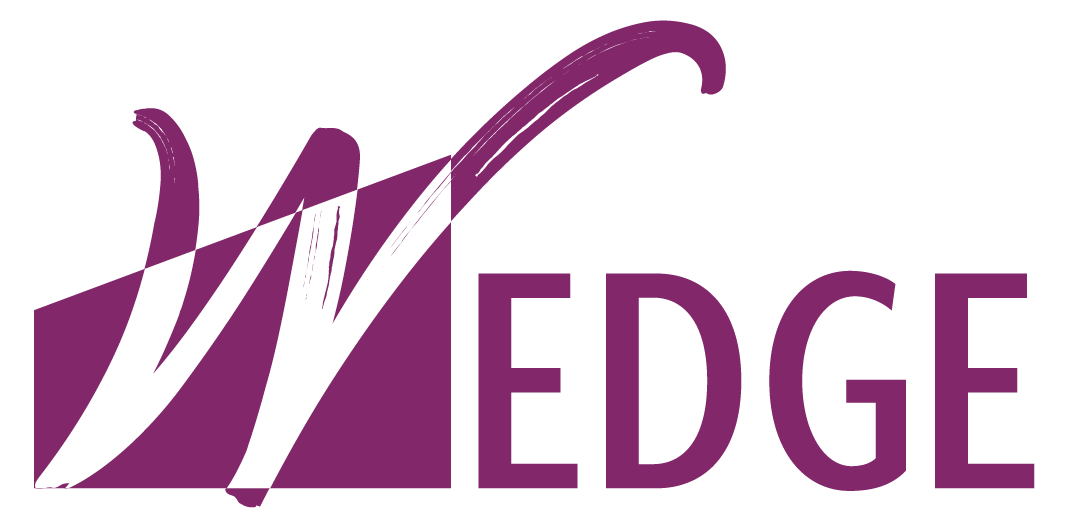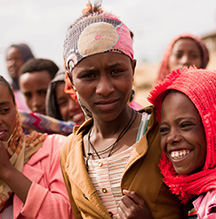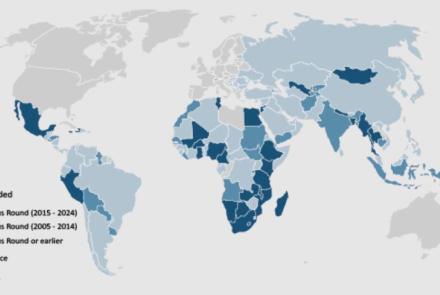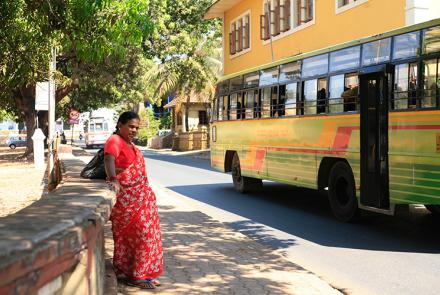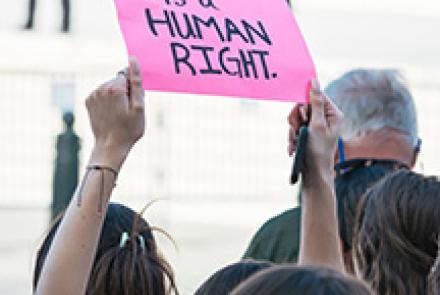HOW CAN A GOVERNMENT CASH-OR FOOD-FOR-WORK PROGRAMME SUPPORT WOMEN’S EMPOWERMENT AND REDUCE INTIMATE PARTNER VIOLENCE?
By Meghna Ranganathan, Marjorie Pichon and Ana Maria Buller
BACKGROUND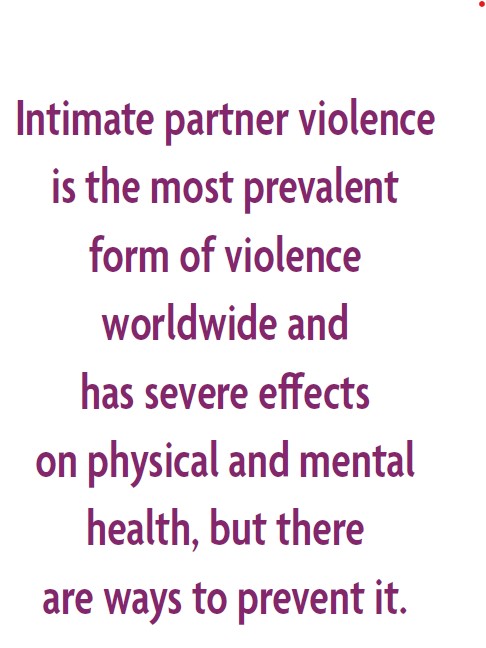
Intimate partner violence (IPV) is the most prevalent form of violence worldwide and has severe effects on physical and mental health, but there are ways to prevent it. Cash transfers and other social safety net programmes have become increasingly widespread with ~11% of the population in low-and-middle-income countries receiving a form of cash assistance. A recent review of the evidence along with case studies from Bangladesh, Ecuador, and Mali have demonstrated that in addition to reducing poverty, these programmes also offer a promising approach to reducing IPV.
There are three pathways outlined in Buller and colleagues (2018) review through which cash transfers can decrease (or increase) IPV.
1. Economic security and emotional wellbeing. In this pathway cash improves a household’s financial situation, which reduces poverty-related stress and improves emotional wellbeing, reducing men’s triggers for perpetrating IPV.
2. Intra-household conflict. In this pathway cash decreases regular arguments about spending money as the budget is less tight. There is anecdotal evidence that cash could result in increasing household conflict over how the extra money is spent.
3. Women’s empowerment. In this pathway cash targeted to women and complementary trainings that increase their knowledge and skills may increase women’s agency, making her less tolerant of violent behaviour. However, there is evidence that in some contexts this can also trigger male backlash and IPV.
Evidence gaps
Although these pathways provide a good foundation, the mechanisms by which cash-or food-for-work programmes can affect IPV are not clearly understood. There are also gaps in our understanding of how the provision of complementary activities, such as gender or nutrition trainings, can enhance the impacts of cash-or-food-for-work programmes and reduce IPV. As part of the cash transfers and IPV research collaborative we set out to begin to fill these gaps in the evidence through a study in Ethiopia.
Programme and study
The Government of Ethiopia’s national social safety net programme called The Productive Safety Net Programme (PSNP) provides poor, rural households food or cash payments in exchange for seasonal labour in public works. To enhance participants’ economic security, health and wellbeing many complementary trainings are also provided, including on financial literacy, starting a small business, best farming practices, nutrition, and gender equality, among others. Using a robust evaluation experimental design including surveys, interviews and focus group discussions we were able to measure the overall impact of these activities on participants’ experience of IPV.
We sought to answer the following research questions:
1. How does PSNP and the complementary activities affect IPV?
2. How do men respond to women’s empowerment?
3. How does engaging men and women together in complementary activities affect gender roles and gender equitable attitudes?
RESULTS AND IMPLICATIONS
Overall, the complementary activities had limited impacts on IPV, but we found quantitative and qualitative evidence to support each of the three pathways outlined by Buller and colleagues (2018). We also identified a new, fourth pathway specifically related to engaging men in complementary activities.
There was qualitative evidence that participating in PSNP only (without any complementary activities) partially alleviated economic stress and improved emotional wellbeing in the family (pathway 1) as the work provided participants a sense of purpose. We also have qualitative evidence that participating in PSNP only, decreased daily quarrels in the household due to the additional income (pathway 2). However, there was no evidence of an impact of participating on PSNP only on women’s empowerment (pathway 3).
On the other hand, the complementary activities led to reductions in financial worries and stress (pathway 1) and decreases in arguments (pathway 2). Further, unlike with PSNP only, we saw that there were positive impacts on women’s empowerment (pathway 3) where women reported becoming financially independent and more self-confident after participating in complementary activities. Both qualitative and quantitative evidence demonstrated that participating in the complementary activities increased women’s financial decision-making power in
the household (pathway 3). We also found that women reported gaining respect from their husband and the community through increased nutritional and financial knowledge.
We qualitatively found that men had conflicting opinions about women’s empowerment, and some feared losing their own position of power in the household. This was also supported quantitatively, where it was found that although complementary activities led to increases in women’s decision-making, they did not lead to decreases in husband’s controlling behaviours. Thus, although men might have been grateful for women’s financial contributions to the household, they also felt their role as main providers threatened, resulting in some cases in increased male backlash in the form of controlling behaviours.
Finally, we found that male participation in the complementary activities affected patriarchal gender roles by shifting men’s attitudes towards becoming more gender equal (pathway 4). For example, men reported a willingness to participate in nutrition trainings, which is traditionally seen as a woman’s domain, which led to greater participation in household chores and meal preparation resulting in increases in mutual respect within the couple.
This study contributes to the limited literature on the impacts of cash-or-food-for-work and complementary activities on IPV. We show that even though there were minimal impacts on IPV, the provision of complementary activities impacted on the drivers of IPV (e.g., poverty, daily quarrels, women’s empowerment and men’s attitudes). Overall, our findings indicate that when complementary programmes are coupled with cash-or-food-for-work programmes, there is the potential for it to be gender transformative and prevent the drivers of IPV.
CITATION
Meghna Ranganathan, Marjorie Pichon, Melissa Hidrobo, Heleene Tambet, Wastina Sintayehu, Seifu Tadesse, Ana Maria Buller (2022) Government of Ethiopia’s public works and complementary programmes: A mixed-methods study on pathways to reduce intimate partner violence, Social Science & Medicine, Volume 294, 2022, https://doi.org/10.1016/j. socscimed.2022.114708.
Cash transfers and IPV research collaborative:
https://www.ifpri.org/project/cash-transfer-and-intimate-partner-violence-research-collaborative
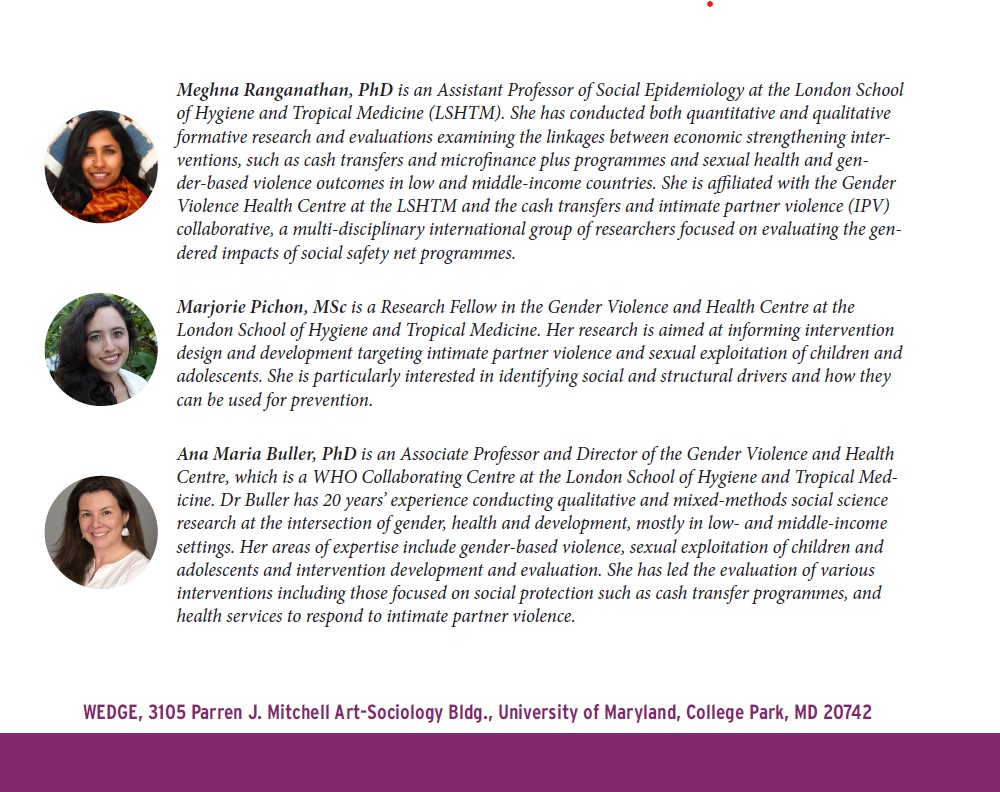
- Log in to post comments
